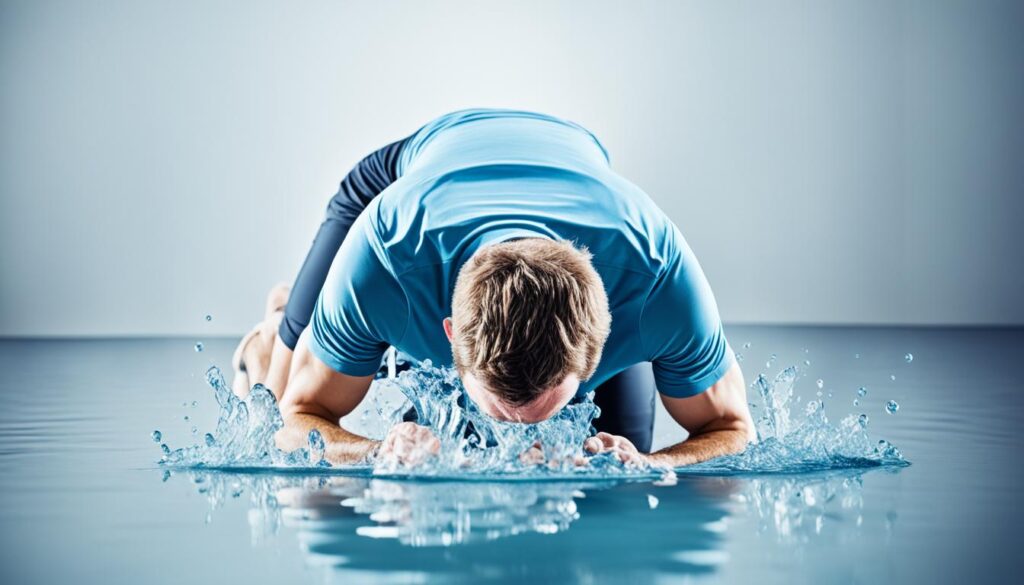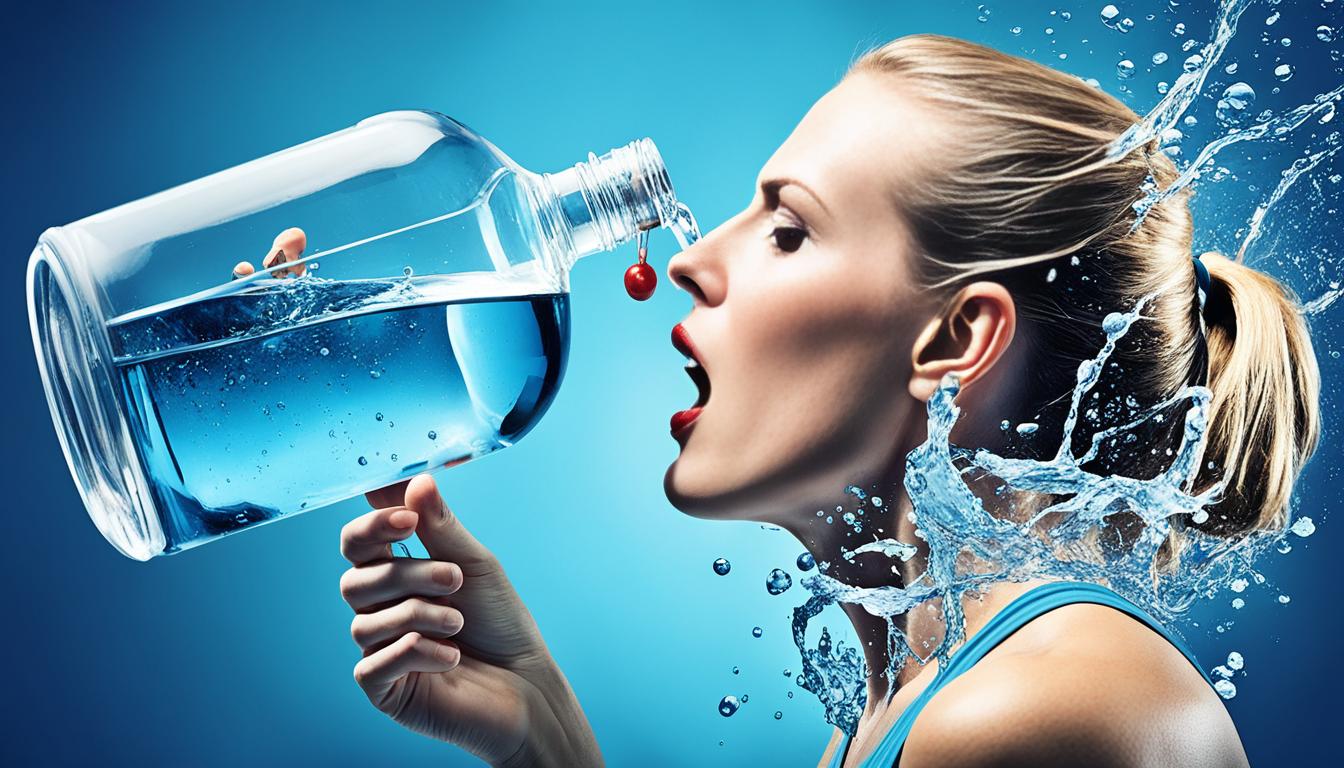The water diet has become popular for weight loss, but it’s important to know the risks and misconceptions. A 2023 review in Nutrients found that it might improve life quality and reduce fatigue. Yet, it’s key to be careful to avoid dehydration, nutrient shortages, and other issues.
A 2021 study in PLoS One showed the 5:2 diet could help with weight loss. But, most diets don’t work well, leading to a high failure rate. Walking a mile burns about 100 calories, showing the challenge in balancing calories with exercise. Eating too little can also slow down your metabolism, making it harder to lose weight.
To safely try the water diet, know the common mistakes to avoid. These include not preparing well, not drinking enough water, eating too much before starting, ignoring electrolyte balance, fasting too long, and not breaking the fast right. Avoiding these mistakes can help you succeed with the water diet.
Key Takeaways
- Be aware of the potential risks and misconceptions associated with the water diet, such as dehydration, nutrient deficiencies, and electrolyte imbalance.
- Most diets don’t work, indicating a high failure rate when following strict regimens with specific food rules.
- Eating too little can affect the body’s metabolism, leading to adjustments that may hinder weight loss efforts.
- Common mistakes to avoid on the water diet include not preparing properly, inadequate water consumption, and overeating before starting the diet.
- To ensure a safe and healthy approach to the water diet, listen to your body, make manageable changes, and focus on nutrient-dense foods.
Not Preparing Properly for the Water Diet
Starting a water diet without proper prep can cause discomfort and health risks. It’s key to prepare your body and mind for fasting. This means reducing food intake slowly, getting the right supplies, and setting realistic goals.
Failing to Gradually Reduce Food Intake
Many people make the mistake of cutting out food suddenly when starting a water diet. It’s important to reduce food slowly to ease into fasting. Here’s how to do it:
- Reduce portion sizes slowly over 3-5 days
- Stop eating processed foods, sugars, and caffeine
- Eat more fruits, vegetables, and lean proteins
- Drink more water to get ready for the fast
Dr. Alan Goldhamer, who has helped over 10,000 patients at TrueNorth Health Center, says a slow transition into fasting helps avoid side effects. This makes fasting more comfortable.
Neglecting to Gather Necessary Supplies
Before starting your water diet, make sure you have all the right supplies. Not having them can make fasting hard and increase the chance of dehydration or not getting enough nutrients. Here are some must-haves:
| Supply | Purpose |
|---|---|
| Pure, filtered water | Staying hydrated and flushing out toxins |
| Herbal teas | Providing variety and supporting relaxation |
| Electrolyte supplements | Maintaining electrolyte balance, especially during extended fasts |
| Journal or notepad | Tracking progress, emotions, and physical sensations |
Preparing well for your water diet and getting the right supplies makes fasting easier and more successful. Always listen to your body, drink plenty of water, and get medical advice if you have health concerns.
Inadequate Water Consumption During the Diet
It’s key to stay hydrated during the water diet to avoid dehydration and its symptoms. Not drinking enough water can cause headaches, dizziness, and fatigue. These symptoms can make the diet less effective.
Experts suggest drinking at least eight 8-ounce glasses of water daily. But, your needs can change based on your age, gender, activity level, and where you live. Here’s a guide for how much fluid you should aim for:
| Gender | Recommended Daily Fluid Intake |
|---|---|
| Men | About 15.5 cups (3.7 liters) |
| Women | About 11.5 cups (2.7 liters) |
About 20% of our daily fluids come from food. So, eating water-rich foods like cucumbers, melons, berries, lemons, and limes helps with hydration.
Most healthy people can stay hydrated by drinking water and other fluids whenever they feel thirsty.
Caffeinated drinks like coffee and soda can also count towards your daily water intake. But, don’t overdo it. Too much caffeine can cause dehydration and other problems.
Pay attention to your body while on the water diet. If you’re thirsty or feel lightheaded, drink more water. Not drinking enough water can lead to health issues like headaches, constipation, and fatigue.
- Persistent headaches
- Sluggish bowel function, constipation, abdominal pain, and cramps
- Dry, ashy skin, affecting skin radiance and elasticity
- Fatigue and reduced energy levels
- Mistaking thirst for hunger, leading to potential weight gain
- Dry mouth
Focus on drinking enough water and preventing dehydration to keep your body working well. This supports your health and well-being.
Overeating Before Starting the Water Diet
Many people make the mistake of eating too much before starting the water diet. It might seem like a good idea to eat a lot before a diet, but it can actually make fasting harder. Eating a lot before can make it tough to stick to the diet.
Consuming Large Meals Prior to Fasting
Some think eating a lot before a fast will help them not feel hungry later. But, this can actually cause problems. Foods high in carbs and salt can make you retain water and feel bloated. This makes you uncomfortable and can make it hard to see how well you’re doing on the diet.
It’s better to eat normal-sized, balanced meals before your fast. This helps you avoid the issues that come with eating too much.
A study showed that drinking water before a meal on the water diet helped people lose about 5 pounds more. This shows how important it is to stay hydrated and not overeat before starting the diet.
Blood Sugar Fluctuations Due to Overeating
Eating a lot before the water diet can also cause your blood sugar to go up and then down. Foods high in sugar make your blood sugar spike. Then, your body makes insulin to move glucose into your cells. But this can lead to a drop in blood sugar, making you feel tired and hungry.
Keeping your blood sugar stable is key during a water fast. By eating balanced meals before your fast, you can help control your blood sugar. This makes it easier to start fasting.
| Pre-Fasting Meal Size | Potential Consequences |
|---|---|
| Large, excessive meals | Water retention, bloating, discomfort |
| High-carb, high-sugar meals | Blood sugar spikes and crashes, increased hunger |
| Normal-sized, balanced meals | Stable blood sugar, easier transition to fasting |
To do well on the water diet, eat regular, healthy meals before your fast. This helps you avoid the problems of overeating and makes fasting easier.
Common Mistakes to Avoid on the Water Diet
Starting the water diet requires knowing the pitfalls that can slow your progress and harm your health. One big mistake is not paying attention to electrolyte balance. This is crucial for keeping your body working right during fasting.

Ignoring Electrolyte Balance
Electrolytes like sodium, potassium, and magnesium help control fluid balance, nerve signals, and muscle movements. When you fast, your body loses these electrolytes, causing tiredness, muscle cramps, and headaches. To avoid electrolyte deficiency, add electrolyte-rich drinks or foods like coconut water or bone broth to your fast.
Fasting for Prolonged Periods
Intermittent fasting can help with weight loss, but fasting too long can be bad. Prolonged fasting can cause muscle loss and not enough nutrients. Listen to your body and keep fasts short. Start with the 16/8 method, eating for 8 hours and fasting for 16.
| Fasting Method | Eating Window | Fasting Period |
|---|---|---|
| 16/8 | 8 hours | 16 hours |
| Eat-Stop-Eat | N/A | 24 hours, 1-2 times per week |
| 5:2 Diet | 5 days of regular eating | 2 non-consecutive days of 500-600 calorie intake |
Breaking the Fast Improperly
It’s easy to eat too much after fasting. But eating too much can upset your stomach and undo fasting’s benefits. Start with small meals after fasting and slowly increase the size over a few days. Choose foods high in protein, fiber, and healthy fats to help your body recover.
Remember, the key to success on the water diet is to approach it mindfully and listen to your body’s signals. By avoiding these common mistakes and prioritizing your well-being, you’ll be better equipped to achieve your weight loss goals while maintaining optimal health.
Disregarding Your Body’s Signals
Listening to your body is key when starting a water diet. Keep an eye on your hunger and energy levels. These signs tell you what your body needs and how it’s doing. Ignoring them can lead to health issues and make the diet harder.
It’s vital to notice and act on your body’s signals during a water fast. Feeling very hungry or weak might mean you need to change or stop fasting. The Health Site warns ignoring these signals can cause poor hydration and health problems.
“The body is incredibly wise and will give you clear signals when it needs nourishment. Learning to listen to and trust these signals is a crucial aspect of a successful water diet.”
Water fasting can help with weight loss, clear your mind, and boost energy. But, start with short fasts of 16 to 24 hours if you’re new to it. Longer fasts are for those who have experience.
When on a water diet, pay attention to these things:
- Hunger levels: Feeling very hungry or having constant hunger might mean you need to eat a balanced meal.
- Energy levels: Check how energetic you feel all day. Feeling very tired or slow could mean your body needs more food.
- Mood changes: Notice how you feel emotionally. Feeling more irritable, anxious, or having trouble focusing could mean you need to rethink your fasting plan.
Adding light exercises like walking or yoga to your fasting can improve your experience. These activities boost the fasting benefits and help with overall health. But, listen to your body and don’t overdo it, especially with longer fasts.
| Fasting Duration | Recommended For | Potential Benefits |
|---|---|---|
| 16-24 hours | Beginners | Weight loss, improved insulin sensitivity |
| 24-48 hours | Intermediate fasters | Autophagy, enhanced fat burning |
| 48+ hours | Experienced fasters | Stem cell regeneration, heightened growth hormone levels |
Everyone’s body reacts differently to fasting. It’s important to tailor your fasting to your needs and goals. If you’re uncomfortable or have concerns during your water diet, talk to a healthcare professional for advice.
By listening to your body and making changes as needed, you can enjoy the benefits of a water diet while keeping your health and well-being in mind.
Neglecting Stress Management and Sleep Quality
Starting the water diet means not forgetting the importance of managing stress and getting good sleep. These things can really affect how well you lose weight and feel during the fasting period.

The Impact of Stress on Digestion and Metabolism
Stress can mess with our digestion, nervous system, and sleep. It makes our bodies release cortisol, a hormone that can mess up digestion and metabolism. High cortisol levels can lead to more fat storage, especially around the belly.
To handle stress while on the water diet, try these tips:
- Eat at least five portions of non-starchy vegetables per day
- Start the day with a balanced breakfast
- Prioritize protein intake (aim for 0.75 gram/kg of body weight)
- Eat regular meals and avoid highly refined carbs
- Limit caffeine intake and be mindful of emotional eating habits
Doing things that help reduce stress like going outside, exercising gently, reading, listening to music, meditating, and doing yoga can also help. If stress is really getting to you, don’t be afraid to talk to a healthcare professional for help and advice.
The Importance of Adequate Sleep During the Water Diet
Getting enough sleep is key for your health, especially when you’re on the water diet. Try to get at least seven to eight hours of sleep each night. Not getting enough sleep can mess with hormone levels, making you crave more and slow down your metabolism.
| Sleep Quality | Percentage of Medical Students Affected |
|---|---|
| Poor Sleep Quality (Kathmandu Study) | 44% |
| Average Sleep Duration (Medical Students) | Approximately 6.5 hours |
Here are some ways to get better sleep on the water diet:
- Establish a consistent sleep schedule
- Create a relaxing bedtime routine
- Ensure your bedroom is cool, dark, and quiet
- Avoid electronic devices at least an hour before bedtime
- Practice relaxation techniques such as deep breathing or meditation
Being consistent with these changes is key for lasting weight loss and feeling good on the water diet.
By focusing on stress management and sleep, you’ll be ready to tackle the water diet’s challenges. This will help you reach your weight loss goals in a healthy way.
Conclusion
Starting a safe water diet can help you lose weight healthily if you do it right. It’s important to know the possible challenges and how to avoid them. Always make sure you’re drinking enough water to keep your body working well and prevent dehydration.
Getting ready for the water diet is key to doing well. Start by eating less food, get your supplies ready, and manage your stress. Also, don’t forget to keep an eye on your electrolyte levels, don’t fast too long, and don’t stop fasting the wrong way.
As you go on your water diet, pay attention to how you feel. If you notice any bad symptoms, talk to a doctor right away. Being careful, prepared, and informed will help you make the water diet work for you. This way, you can lose weight safely and keep it off for good.




